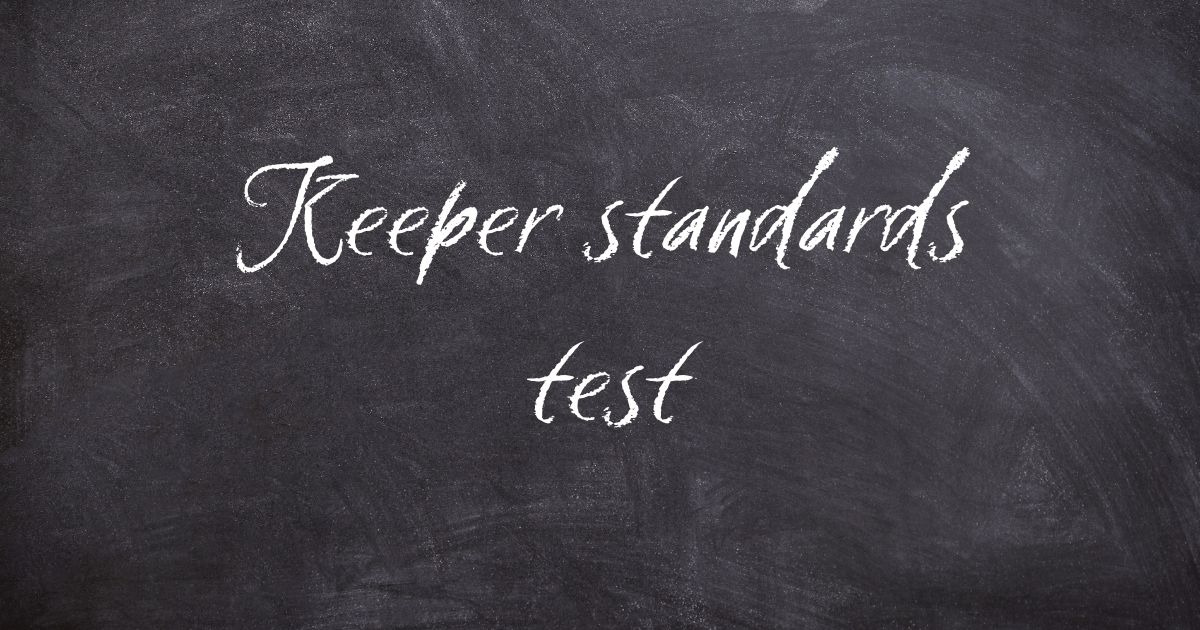The Keeper Standards Test is a critical evaluation tool designed to assess the skills, knowledge, and abilities of goalkeepers across various levels of play. Whether in soccer, hockey, or any other sport requiring a goalkeeper, this test ensures that keepers meet a set standard of performance. Understanding the test is essential for players aiming to excel in their position. This guide provides an in-depth look at the Keeper Standards Test, detailing its purpose, structure, importance, and how goalkeepers can prepare for it effectively.
What is the Keeper Standards Test?
The Keeper Standards Test is a structured assessment that measures a goalkeeper’s abilities in multiple areas such as reflexes, positioning, decision-making, and communication. It sets a benchmark for goalkeepers to achieve a certain level of competence and helps coaches evaluate their players’ performances objectively.
The Purpose of the Keeper Standards Test
The primary purpose of the test is to ensure that goalkeepers possess the fundamental skills necessary to perform at a competitive level. By implementing a standardized evaluation, coaches and teams can identify strengths and areas for improvement in their goalkeepers.
Key Skills Assessed in the Keeper Standards Test
The Keeper Standards Test evaluates various skills essential for goalkeeping success. Each of these skills is crucial for goalkeepers to master their role effectively.
Reflexes and Reaction Time
A goalkeeper’s ability to react quickly to shots, deflections, and unexpected movements is tested. Fast reflexes help keepers make crucial saves in high-pressure situations.
Positioning and Footwork
Proper positioning reduces the angles available to attackers, making it easier to block shots. The test assesses a keeper’s movement within the goal area, footwork efficiency, and ability to adjust quickly.
Handling and Ball Control
The ability to catch and control the ball effectively is critical. The test evaluates how well a keeper handles high and low shots, crosses, and rebounds while maintaining control.
Shot-Stopping Ability
A keeper’s ability to stop shots from various distances and angles is analyzed. This includes diving saves, close-range reactions, and long-range shot defense.
Communication and Leadership
Goalkeepers are responsible for organizing their defense. The test assesses a keeper’s ability to communicate effectively with teammates, direct defenders, and maintain situational awareness.
Distribution and Kicking Accuracy
Modern goalkeepers must play a role in initiating attacks. The test evaluates a keeper’s ability to distribute the ball accurately through throws, goal kicks, and passes.
Decision-Making Under Pressure
Quick decision-making is essential in goalkeeping. The test examines how well a keeper judges when to stay on the line, come off the goal, or intercept passes.
The Structure of the Keeper Standards Test
The test is typically divided into multiple sections, each designed to measure a specific aspect of goalkeeping. Depending on the level of play, the format and difficulty may vary.
Physical Fitness Assessment
Goalkeeping requires agility, strength, and endurance. This segment includes agility drills, sprint tests, and strength exercises.
Technical Drills
Technical drills focus on handling, footwork, diving, and distribution. These drills simulate real-game situations.
Game Simulation
In this section, goalkeepers face live-action scenarios such as penalty shots, one-on-one situations, and counterattacks.
Tactical Evaluation
Coaches assess a keeper’s ability to read the game, make quick decisions, and position themselves strategically.
How to Prepare for the Keeper Standards Test
Proper preparation is key to passing the test with high scores. Here are some essential training strategies to help goalkeepers perform their best.
Enhance Reflexes and Agility
Drills such as reaction ball training, agility ladder exercises, and quick-direction changes improve reflexes and agility.
Improve Handling Techniques
Practicing catching drills, hand positioning, and grip strength exercises will help improve ball control and reduce errors.
Work on Footwork and Positioning
Regular movement drills focusing on quick lateral movements and positioning will help keepers cover their goal effectively.
Develop Communication Skills
Practicing clear and concise communication during team drills enhances leadership skills on the field.
Strengthen Kicking and Distribution
Practicing goal kicks, throws, and short passes ensures precise and effective ball distribution.
Mental Preparation and Focus
Visualization techniques, breathing exercises, and game analysis help improve focus and decision-making under pressure.
The Importance of the Keeper Standards Test
This test is valuable for both players and coaches. It provides a clear benchmark for goalkeepers to aim for, highlights strengths and weaknesses, and helps with overall team development.
Conclusion
The Keeper Standards Test is an essential evaluation for goalkeepers looking to improve their skills and meet professional standards. By understanding its structure and preparing effectively, goalkeepers can enhance their performance and secure their position as key players in their teams. Whether at the amateur or professional level, mastering the skills tested in the Keeper Standards Test ensures goalkeepers can perform confidently in competitive matches.
FAQs
How often should a goalkeeper take the Keeper Standards Test? It depends on the level of play. Professional teams may conduct the test annually, while amateur clubs might use it periodically to track progress.
Can young goalkeepers take the Keeper Standards Test? Yes, modified versions of the test are available for youth players to assess their development and skill level.
What is the passing score for the Keeper Standards Test? The score varies by organization, but goalkeepers typically need to meet a set threshold to demonstrate competency.
Does the test vary between different sports? Yes, while the core goalkeeping skills remain the same, specific tests may differ based on the sport.
Can goalkeepers retake the test if they fail? Absolutely. Retesting allows goalkeepers to work on their weaknesses and improve their overall performance.















